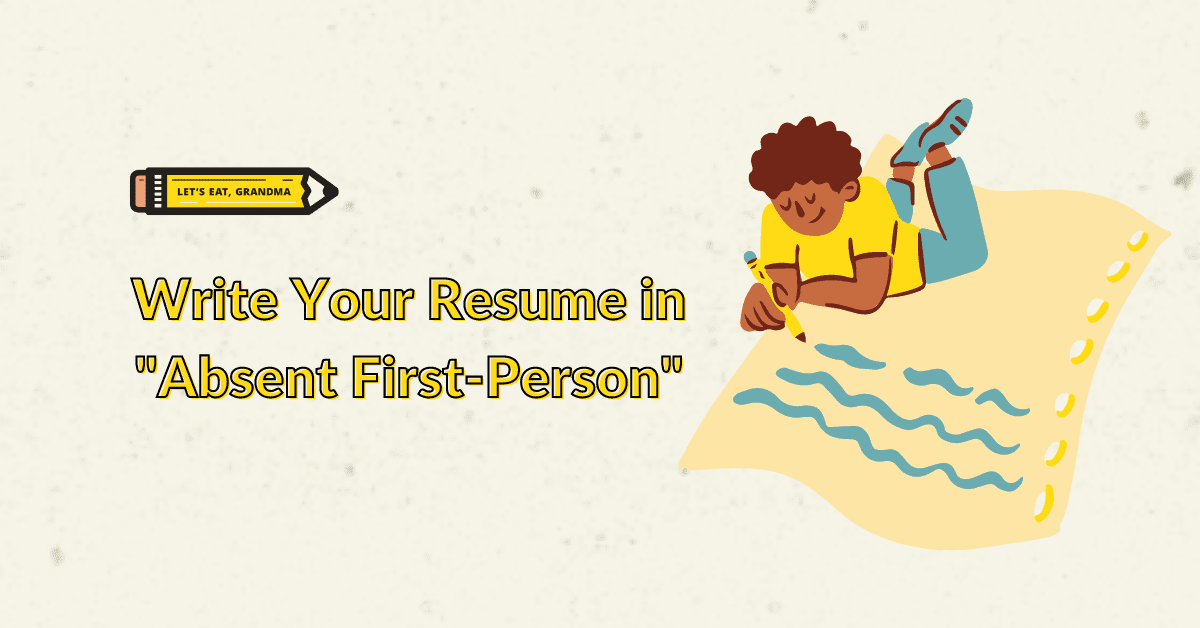Should You Write Your Resume in First Person or Third Person?

A lot of job seekers get tripped up on voice when they sit down to try and write their resume in first person. The trick? Lose the “I” and all other pronouns.
Updated January 2024.
By: Jennifer Meehan | Contributor for Let’s Eat, Grandma
Whether you’re planning to write your first resume or refresh your old one, make sure you use correct grammar.
Nothing stops me cold like “have went” instead of “have gone.” Grammar could make all the difference between getting noticed or getting tossed!
A big part of grammar in a resume is the voice you use.
Job seekers often wonder, “Should I write my resume in the first person or the third person?”
Using first person in your resume
At Let’s Eat, Grandma, we follow the most up-to-date resume writing best practices, which call for first person in a resume.
But wait, there’s more. You should write it in “first-person implied” — which means leaving off your first-person pronouns as well.
All that means is that when you write a simple declarative statement about yourself, such as an accomplishment bullet point, you leave off the “I” and start with the verb.
It’s clear from the context that the subject of the sentence is “I”.
Ready for more job search help?
Sign up for a free Senior Writer Resume Critique to see what's holding you back from landing interviews. One of our top professional resume writers will give you personalized feedback on the top 3 items you can improve based on our expert practices!

Photo by Felicia Buitenwerf on Unsplash
So, rather than:
I manage a team of 20 salespeople
I managed a team of 20 salespeople
The statement becomes:
Manage a team of 20 salespeople
Managed a team of 20 salespeople
Can you see the difference? Without the “I” the statement becomes much more impactful because you’re starting with an active verb. And it’s a complete statement because the subject is implied.
And while we’re on the subject of verbs, always try to use active ones. Instead of “Did the publishing schedule,” for example, say “Created and implemented the publishing schedule.”
A very short primer on grammar
I have been a copy editor for some 30 years and I still have to look up grammar questions from time to time. It’s been a long time since middle school, so here’s a refresher about voice, grammatical person, or point of view. Don’t worry, there will be no questions about “third-person omniscient.”
All you really need to know about person for the purpose of job hunting are the pronouns:
- First-person pronouns include I, me, mine, we, ours because you are referring to yourself, or a group of which you are a part. As mentioned before, you’ll use this voice in your resume, without the pronouns. You should also always use first person in your cover letter, and since it’s a letter you’ll use pronouns, for example: “I mastered French when I was three.”
- Second-person pronouns include you and your because you’re referring to another person or group of people. Of course, you would not use second person in a resume because you are talking about yourself.
- Third-person pronouns include he, she, it, they because you’re referring to an “other,” a third person or persons being talked about in the sentence. You should absolutely not use these pronouns in a resume because it’s just silly and pompous, for example “Jennifer manages the sales team,” when you are Jennifer. Your reader already knows it’s you because your name is at the top.
Why you shouldn’t use pronouns in your resume: Appearance counts

Photo by JESHOOTS.COM on Unsplash
You don’t want to resume to stand out in a bad way. Using an implied I can make your resume more readable and interesting. Besides, it saves space. When you’re trying to keep your resume under 600 words or so, even the narrow “I” takes up room and counts as a word.
Also, dropping the I will even make the resume look better because you avoid a river of “I”s running through the page. As an editor, I learned the importance of avoiding repeated words because it’s distracting to the eye – especially a short word like “I”.
Instead, every bullet point will start with an engaging action verb, pulling in the attention to your achievements. Anything you can do to make the resume more readable and engaging for hiring managers is essential. They are already so busy, they don’t want to spend time looking for the verbs showing what you did.
Besides, bullet points written with an absent “I” look professional and give a sense of objectivity. The style detaches you from the person eagerly seeking an interview and presents your serious business self.
A resume in first-person implied is expected by recruiters. In fact, it is really only used in resumes. As a longtime editor, I can guarantee that you will never see a novel or nonfiction narrative written without subjects and pronouns!
In summary, the use of first-person implied style in resumes offers a unique blend of professionalism and personal touch. This approach allows you to assert your achievements and skills confidently without the repetitiveness or formality of first-person pronouns. It makes your resume more engaging and reader-friendly, focusing on your accomplishments and value-add to potential employers. By mastering this style, you can create a resume that not only stands out but also reflects a clear and powerful image of you as a proactive, results-driven professional. Remember, your resume is your personal marketing tool – make every word count to paint a vivid picture of your capabilities and achievements.
Ready for more job search help?
Sign up for a free Senior Writer Resume Critique to see what's holding you back from landing interviews. One of our top professional resume writers will give you personalized feedback on the top 3 items you can improve based on our expert practices!
